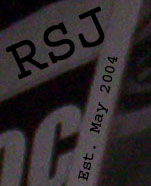|
Forget about Kraftwerk and Front 242 -- the real roots of the industrial scene can be traced back to Chuck D and Beethoven.
Or, at least the roots of Stromkern can. With a band founder, Ned Kirby, who spent his formative years equally influenced
by classical training and a love of hip-hop, Stromkern began with one foot outside the industrial box. Though it's now been
eight years since the band's first release, Kirby is still innovating, as he moves away from the EBM scene which first embraced
Stromkern to create something new with "Light It Up," a disc that features more of the live instrumentation the
band has employed in their stage shows. Having just completed a successful US tour, Stromkern prepares to take it to the coldwave
crew with a few upcoming dates with Acumen Nation.
Rock Star Journalism: Given that your background isn't exclusively industrial/electronic music, what was your first introduction
to this scene?
Ned Kirby: I used to spin, 10-15 years ago. Going to clubs as a kid, that's when I was first exposed to electronic music.
There was something really magical about it, I found.
RSJ: You've mentioned that hip-hop was one of your earliest musical influences. Who were some of the artists you were
interested in while growing up?
NK: The first big influence was Public Enemy. They were -- and still are -- a major inspiration. There was so much of
the "industrial" aesthetic going on there -- the first three PE records are these intense deconstructionist, post-modern,
street-political noise manifestos; even today I find them amazing. All the Bomb Squad productions of that era, really -- like
the first couple of Ice Cube records, go back and listen to those and think about how they had to have been made in an era
predating computer editing. The mind boggles.
At the same time as I was discovering that whole type of artist, I was also attracted to very majestic sort of rock productions
-- things like Jane's Addiction and the Sisters of Mercy and Faith No More, where everything was big and epic and expensive.
I think that's why Nine Inch Nails was so electrifying when it first hit the scene -- it was really the first time those two
worlds collided. It was part street and part glam rock, and it really introduced a whole new paradigm.
RSJ: Stromkern's sound has evolved over the years, incorporating more live instrumentation. Do you feel that there are
any set parameters as to what Stromkern is or is not?
NK: I used to try to define some parameters, but now I'm of the opinion that setting parameters is like setting limits
-- it feels productive in the short term, but it's ultimately unfulfilling. You've got to experiment and push yourself. It's
really easy to fall into a pattern, and I think that for a lot of people, a lot of artists, you really need to be self-critical
and ask yourself if what you're doing is just rehashing where you've already been. Which is not to say that one should just
experiment wildly and release whatever comes out, though some people are more capable of that than others -- I mean if you're
Phish, then I guess that's a great way to make records. Ultimately, I feel that Stromkern will always reflect my own personal
tastes, and I think the core of what appeals to me musically is more or less constant. So, I don't feel so much of a need
to set parameters about what I can and can't do with the project.
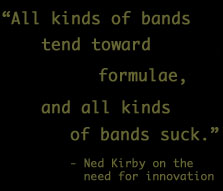 RSJ: You've stated that, musically, you don't feel any affinity with the current EBM bands, despite this being the genre you
first began working with. Why do you now feel a separation from this scene?
NK: Maybe because of what I alluded to above, which is the setting of limits. Bands in the EBM scene, or the gothic scene
or whatever it's called these days, tend towards certain formulae. Of course, all kinds of bands tend towards formulae, my
own included, and all kinds of bands suck. It's a very difficult thing, to pinpoint what about an artist distinguishes them
from the flock. A lot of people could point at Iris and say, hey, they're just another synthpop band, but clearly they aren't:
there is something fundamentally different about the way they approach music that makes the end result stand out from the
crowd. Wolfsheim would be another example -- ultimately, they transcend genre. But very few bands in that scene are interested
in transcending genre, and as a result I find it rather tiresome.
I guess ultimately it comes down to, are people making genre records that seek out a certain audience, or are people just
making the records they'd make were they left to their own devices? I enjoy a lot of different music from a lot of different
styles, but I think the common thread between all those bands or records would be that, for the most part, the people making
them were simply letting loose their souls; they weren't trying to conform to someone else's idea of what their music should
sound like.
RSJ: How did the process of creating "Light It Up" differ from your previous work?
NK: Well, it differed from "Armageddon" in that we weren't all in the same place at the same time. Other than
that, it proceeded much as previous records have: you start some things, you think some things are great, those things turn
out to be useless, other ideas resurface and are reinterpreted in new ways, etc. We did have a chance to road-test most of
the new material before committing ourselves to final recorded versions on this record, which was quite positive in terms
of the end results.
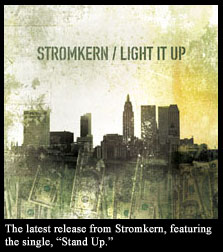 RSJ: You have vocal contributions from Frank Spinath and Victoria Lloyd on this album. Why did you decide to get outside
collaborators, since you've never done this in the past?
NK: I didn't really decide, it just sort of happened. We'd known Frank from our tour with Seabound in 2002, and the track
seemed to suit his vocal; he liked it, did the vocal, that was that. The song with Victoria, I had that one more planned;
I've always loved the sort of "heavenly voices" style, the sort of mid-1990s Hyperium sound, like an electronic
4ad. I sort of wanted to combine that with a Schubert "Lieder" kind of arrangement. Not exactly what came out the
other end, but I think the track is still quite nice. Someday I'd still like to do a record that's just piano and vocal. If
the songs are strong, it can be really amazing.
RSJ: This album is more political than you've been previously. What message would you most hope listeners would get out
of this album?
NK: I don't really think of it in terms of a message I'm intending people to interpret. The political content of the record
is simply a result of my reaction to my surroundings at the time. If that inspires people, so much the better, but the record
isn't about me trying to tell people what to do or think; it's just my internal reactions to the state of affairs I was exposed
to at the time we were making the record. I suspect other people might feel the same way, but who knows.
RSJ: In the past you've shied away from making direct political statements with Stromkern -- why the change with "Light
It Up?"
NK: My lyrics have always been personal; they've always been interpretations of the events affecting me at a certain point
in time. At this particular point in time, a lot of political events are having a marked effect on me, hence I think the record
became more political as a result.
RSJ: In lieu of printing lyrics, you asked fans to send in their own interpretations of the lyrics on this album. Have
you received any particularly interesting submissions?
NK: We've gotten a few interesting submissions, but not as many overall submissions as I'd hoped for. Send in your lyrics,
people!
RSJ: You've been involved with WTII for the past few releases. Are you satisfied with your relationship with this label?
NK: WTII have been really supportive since day one. They may not have the financial muscle of some other labels, but they
have really put their all into every release and have always treated Stromkern with the utmost respect -- and treating bands
with that kind of respect is really an unfortunate rarity in this industry. So, I've been quite pleased with our working relationship.
I mean, so many labels are going to get in your face about the records you deliver; these guys, they really let the artists
do their job. It's been a great ride.
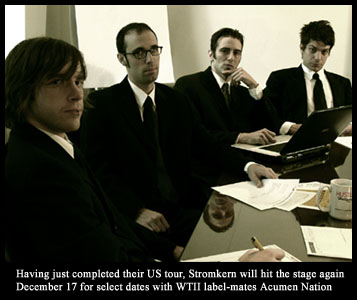 RSJ: In the past, you've talked about why you think downloading is a problem, stating that file sharing has ushered in a generation
that doesn't see any need to buy music. Do you still feel that this is a large problem for independent artists?
NK: I think that it is, although I'm not sure what's to be done about it. Clearly, online distribution is the way of the
future, but it's not yet clear to me how it can be made to benefit the artist. While the distribution explosion benefits those
who might never have had a voice, I feel like it also creates a glut that has an effect on how music as a whole is perceived
by the public. Music should be a magical thing, not merely background noise. A song is a thing to be treasured and marveled
at, not paraded for six seconds accompanying a car commercial and then discarded. Good music quite often takes a great deal
of effort to perfect -- Beethoven's symphonies were not written in a matter of days, for example, and I think it shows; they
are still masterpieces, hundreds of years on. Will we say the same for Grendel records?
RSJ: With the lack of available labels, what do you think is the best way for independent artists to get their material
released?
NK: Well, I wonder how much of a role labels are going to have for the time being, although I also think as time goes
on something akin to labels will emerge again. Instead of signing with Sony, you'll sign with Pitchfork, because they'll have
more influence. It's hard for me to know if getting your material released really matters these days -- I mean, look at Clap
Your Hands Say Yeah! I guess this MySpace business is a big deal, to some people. In terms of just getting things released,
I guess that's easy, you can do it yourself. In terms of getting it heard -- that's the hard part.
RSJ: You've worked with numerous other artists over the years. What has been your favorite non-Stromkern related project
to work on?
NK: Hmm. That's tough. Playing guitar on the Battery Cage shows last year was a lot of fun. It was really nice to just
get up, plug in, and play, and not worry about the show the way I worry about a Stromkern show. I mean, I was still worried
about performing well, but it was a different kind of worry -- it was just a lot of fun. I played keys for HMB at a show in
Chicago a few years back, and that was a lot of fun too. Just a chance to get up on stage and see what happens with some like-minded
people. And Noonerschaft is always a blast when we find the time to
make it happen.
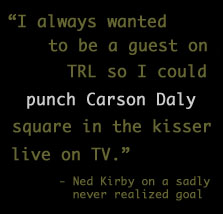 RSJ: Speaking of shows, you just finished the "Light It Up" tour. Were you happy with the results?
NK: Absolutely. A good tour, despite all the various tour hardships one endures on the road. Even our not-so-good shows
were pretty good this time around. A great crew, great musicians, a lot of great crowds, great promoters -- it was a great
time.
RSJ: You mention the "cricket incident" on the website. Care to explain?
NK: Crickets...so many crickets.
RSJ: In a previous interview, you said that European fans tend to expect more synth-based shows, whereas American audiences
respond better to rock-oriented shows with live instrumentation. Do you think that's still the case, given the rise of the
EBM/synth community in the US?
NK: I honestly don't know. At this point, I've sort of given up trying to figure it out, I just decide what it is we're
going to do and then let the chips fall where they may. I figure, if we're making good music, people will like it, and if
we aren't, they won't.
RSJ: How did you get involved with the upcoming dates with Acumen Nation?
NK: I think WTII put us in touch with them. It was at some show here in Chicago, I got to talking with Jason and they
mentioned that they had some shows booked but that the opening bands had dropped off or something, and I said that we'd be
happy to fill in. I'm excited about playing with them because I think they really draw more of a metal/crossover kind of audience;
it's not dance club kids, you know? So, I think it'll be really cool to play for some people who might not otherwise have
heard about Stromkern.
RSJ: Is this the last of the touring for awhile, or will there be more dates next year?
NK: There are always more dates.
RSJ: Finally, what would you most like to see happen for Stromkern in the future?
NK: I always wanted to be a guest on TRL so I could punch Carson Daly square in the kisser live on TV, but now he's gone,
so now I don't know what to do.
Got something to say about this feature? E-mail us.
|
